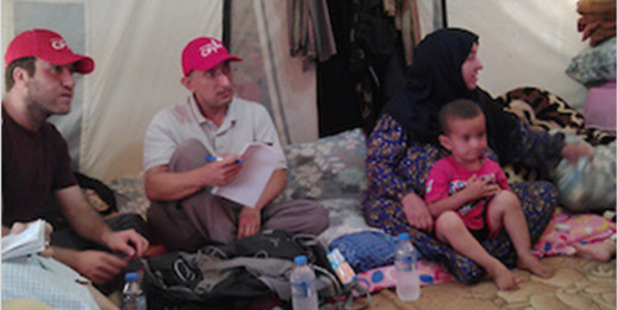CPTnet
27 August 2015
IRAQ: As ISIS atrocities denounced, human rights abuses of Iraqi forces
underreported
by Harmeet Sooden
[Note: Sooden’s piece has been adapted for CPTnet. The original appeared in The New Zealand Herald.]
Iraq’s civilians are caught between Scylla
and Charybdis—between two dire alternatives: on the one side, opposition
groups including ISIS; on the other, the US-led coalition and Iran. While human
rights violations committed by ISIS are widely condemned, those committed coalition
partners, including Iraq, are underreported.
Since the beginning of the conflict, human
rights organisations have been implicating coalition members in human rights
violations that may constitute war crimes. Major coalition contributors such as
the US, Britain and Australia have a poor human rights record in Iraq. The
Iraqi Government, in particular, is responsible for widespread abuses, mainly
against Iraq’s Sunni population.
 |
| Harmeet Sooden (second from left) interviewing a displaced Iraqi family in Arbat IDP Camp in May. Iraqi forces displaced up to 85 per cent of the camp’s 17,300 residents. |
Iraqi security forces have engaged in torture, hostage-taking,
and summary execution of civilians, including women
and children; beheading, lynching, and immolating captives, desecrating
corpses, and celebrating the atrocities in photographs and videos posted
online; looting and wanton destruction of property, and
shelling and bombing residential areas and hospitals. Iraqi and Kurdish
authorities sometimes prevent families fleeing the fighting from reaching safer
parts of the country. Iraqi forces have also established “death zones” around Baghdad.
Coalition airstrikes often precede abuses by Iraqi forces. Not
only are the airstrikes effectively providing cover for what appears to
be ethnic cleansing in areas re-captured from ISIS,
but they are also directly causing civilian deaths that may amount to war
crimes. According to the Red Cross, the airstrikes are compounding the
humanitarian consequences of the conflict.
UN agencies warn that Iraq is “on the
brink of humanitarian disaster” due to the escalating conflict between the
US-led coalition and opposition forces, and the severe shortfall in
international funding. At least 3.1 million Iraqis have been internally
displaced since January 2014. A total of 8.2 million people now require
immediate humanitarian support.
The situation has deteriorated to the point where
“[a]uthorities in Iraqi Kurdistan suspect that displaced people are
selling their kidneys to feed their families.” At the same time, it is
becoming increasingly dangerous for humanitarian workers to
carry out their work.
The UN has concluded that civilians are the primary targets of the conflict in Iraq.
In late June, New Zealand’s Task Group Taji
completed its first eight-week training course for troops from the 76th
Brigade, a formation within the Iraqi Army’s 16th Division. The division was
formed to replace the US-trained units that collapsed in 2014 when ISIS seized
the Mosul region. It is composed of new recruits as well as soldiers who fled
during last year’s assault.
The training cannot address the root causes of the coalition’s
human rights violations, including the structural corruption and sectarianism introduced into Iraq’s
military and state institutions after the 2003 US-led invasion. As the 76th
Brigade deploys to the frontline, possibly to join the Ramadi offensive, the
NZDF cannot eliminate the risk of the training offering the Iraqi army greater
means to worsen the human rights situation.
Several Iraqi soldiers receiving training at Taji have
openly told journalists that “they actively served
on their days off with Shiite militia – some…still listed by the US as
terrorist groups”, some also sponsored by Iran. The UN has reported
pro-government militias, including the popular mobilisation forces (PMF),
“seem to operate with total impunity, leaving a trail of death and
destruction in their wake” that often rivals the depredations of ISIS.
UNICEF has confirmed reports of militias from all sides,
including those supported by the Iraqi Government, recruiting children. The PMF
is reportedly providing combat training to children in
summer camps established throughout the country. Militias fighting alongside
Iraqi and Kurdish forces are using armed boys and girls on the frontline – some
as young as ten. Enlisting children
under the age of fifteen or using them to engage in hostilities is a war crime.
Sectarian abuses continue unabated under the government of the
new Iraqi leader, Haider al-Abadi. Yet, the New Zealand Government insists on backing a regime that is showing little
regard for civilians. When coalition forces were poised to re-conquer Tikrit in
March, Prime Minister al-Abadi said in a speech to the Iraqi parliament:
“There is no neutrality in the battle against ISIS. If someone is being
neutral with ISIS, then he is one of them.” His words epitomise the
dilemma civilians face in areas where ISIS is active.
There is a straightforward way New Zealand can begin to protect
the people of Iraq: namely, by withdrawing its support for the human rights
violators in the coalition, and accepting that worthwhile alternatives exist. New Zealand policymakers
can get away with reckless policies so long as New Zealanders keep silent and
tolerate them.
Harmeet Sooden was kidnapped in Iraq in 2005 while working for Christian
Peacemaker Teams and held hostage for nearly four months. Sooden has recently
returned from Iraqi Kurdistan, where he was working on a human rights project
assessing communal tensions in a camp for internally displaced persons.
CPT-Iraqi Kurdistan will always be on the side of those
resisting forces of sectarian hatred and violence. You can support its work here: https://donatenow.networkforgood.org/CPT?code=IraqiKurdistan



